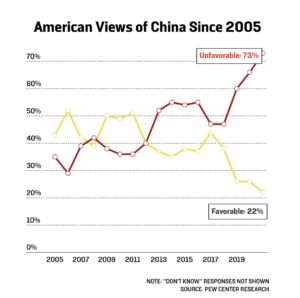Recent data suggests that most voters share the White House’s hawkish approach to China.
Large majorities of the U.S. public, both Democrats and Republicans, align with the Trump administration’s dismal view of China, giving the embattled president a potential appealing drum to bang in an increasingly uphill reelection campaign, according to a new survey by the Pew Research Center.
According to the survey, 73 percent of Americans hold an unfavorable view of China, up from 47 percent just two years ago. The main complaints echo President Donald Trump’s: the nature of the two countries’ economic relationship and China’s handling of the coronavirus pandemic.
Some 64 percent surveyed felt that China had done a bad job handling the pandemic, and 78 percent believe the Chinese government deserves at least some blame for the global spread of the virus.
Meanwhile, more than two-thirds of respondents said U.S.-China economic relations were in bad shape. While Republicans are more likely to hold a negative view of China on most issues than Democrats, U.S.-China economic ties particularly concern Democrats, with 73 percent saying relations are bad—10 percentage points more than Republicans—which could offer Trump a lifeline in must-win Rust Belt states hit hard by years of Chinese economic depredation and the ongoing trade war.
This poll comes as Trump and his administration have taken an increasingly hawkish stance on China. U.S. Secretary of State Mike Pompeo capped a quartet of tough administration speeches last Thursday by slamming the Chinese Communist Party (CCP), accusing it of having designs on “global hegemony” and calling on “the freedom-loving nations of the world [to] induce China to change.” While giving testimony to the Senate Foreign Relations Committee, Pompeo called the CCP “the central threat of our times.”
The two countries have also ramped up their diplomatic quarrel, with Pompeo slamming China’s maritime pretensions in the South China Sea and both states closing each other’s consulates.
The Trump administration has been of two minds about China from the start, with many hawks inside the administration seeking a confrontational approach and an outright decoupling of the world’s biggest economic relationship. Trump, meanwhile, coddled Chinese President Xi Jinping, held off criticizing Chinese actions in Hong Kong and Xinjiang, and touted his mini trade deal with China this year as an economic panacea. (Spoiler: It wasn’t.)
But the new survey suggests that American public attitudes toward China have hardened for good, which indicates that the Trump administration’s aggressive approach could become the new norm, burying nearly 50 years of engagement kicked off with President Richard Nixon’s famous visit to Beijing in 1972. (And the feeling is mutual: A poll released by the Eurasia Group Foundation in April found that only 39 percent of the Chinese public held a favorable view of the United States.)
That could hem in any effort by a future Joe Biden administration to chart a more moderate course toward China—if there remains any desire by a Democratic president to return to a less confrontational stance. One caveat: According to Pew, there is a slim, but shrinking, majority for building a stronger economic relationship, which could give the next administration leeway to back off the Trump administration’s harshest measures.
But Americans are still largely divided over the best way forward. Fifty-one percent still believe it is more important to build a stronger relationship with China, but 46 percent feel that the get-tough approach will be more effective. Despite that discrepancy, the number of those who favor a more aggressive stance has risen sharply since 2019.
Not that a return to the old politics of engagement is necessarily in the cards. “Trump is defining the 2020 electoral agenda in other ways. He has ramped up his isolationist and Sinophobic rhetoric … and accused his rival of being soft on Beijing,” Foreign Policy’s Michael Hirsh wrote this month. “As he is doing with the culture war, Trump is forcing Biden to respond to his lead, rather than merely reacting to his challenger’s attacks.
![]()


